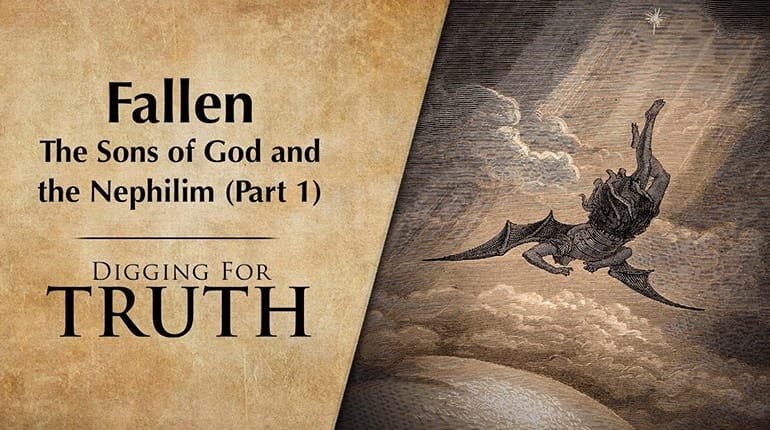The “Sons of God” and the Distortion of Human DNA

The narrative in Genesis 6:1-4 introduces one of the most enigmatic and controversial passages in the Bible: the account of the “Sons of God” and their union with human women, giving rise to the Nephilim. This ancient text raises questions about humanity, the divine, and the potential for genetic manipulation—issues that resonate even today amid modern debates surrounding bioethics and genetic engineering. The implications of this union are profound, suggesting a catastrophic distortion of human DNA that led to significant consequences for all of mankind.
As we explore the theological, historical, and scientific aspects of these verses, it becomes clear that the notion of fallen angels interbreeding with humans was not simply a quaint myth but a serious warning about the consequences of straying from divine order. The idea that a corrupted DNA could arise from such unions leads us to the heart of God’s judgment—the Flood—as recorded in Genesis 6:13, where He declares, “The end of all flesh has come before Me.” Our focus will be on interpreting the significance of this corruption and how Noah’s lineage represented the last vestige of pure human genetics, chosen to begin anew in a world cleansed of this divine-human hybridization.
The Context of Genesis 6
To fully understand the gravity of Genesis 6:1-4, we must consider its historical and cultural context. The early chapters of Genesis present a world that was created good but quickly devolved into chaos and corruption. Chapter 6 introduces a break from this natural order, where the “Sons of God” take wives from the “daughters of men.” This expression is crucial; scholars and theologians have frequently debated the identity of the “Sons of God,” with interpretations ranging from fallen angels to the lineages of Seth, although the former has been a popular perspective throughout Judeo-Christian tradition.
The term “Nephilim,” often translated as “giants,” has sparked diverse interpretations, with implications suggesting not only physical size but spiritual and moral corruption. Some sources suggest that Nephilim were the outcome of a grievous miscegenation—a crossing of divine beings with mortal flesh that led to the emergence of a race whose very existence threatened the integrity of God’s creation. This breeding was more than a mere aberration; it posed a significant threat to the divine intention for humanity.
The Nature of the “Sons of God”
The term “Sons of God” can be understood in multiple ways. Many scholars maintain that in the Old Testament, angels are sometimes referred to as “sons of God” due to their direct creation and relationship with God. This interpretation emphasizes their divine nature, illustrating that the beings involved in this union were not simply humans but celestial entities who had rebelled against God’s order. This rebellion highlights a significant theme in Scripture: the ongoing conflict between good and evil, divine and demonic, which permeates human history and consciousness.
Alternatively, some interpretations suggest that the “Sons of God” were the descendants of Seth, contrasted against the “daughters of men,” who are identified as the descendants of Cain. While this view presents a more humanistic interpretation of the text, it does have reticent implications about the divinely sanctioned boundaries of marriage and the holiness of unions ordained by God.
The Genetic Distortion of Humanity
Regardless of how one interprets the “Sons of God,” the consequence of their illicit unions is underscored through the emergence of the Nephilim. The biblical narrative implies that the intermingling of these two distinct entities resulted in a formidable hybrid that was not just physically daunting but morally and spiritually corrupt. The existence of the Nephilim presents a unique theological dilemma; they embodied a form of humanity who had diverged from their intended creation.
Genesis 6:5-6 further elucidates this point: “Then the Lord saw that the wickedness of man was great in the earth, and that every intent of the thoughts of his heart was only evil continually. And the Lord was sorry that He had made man on the earth, and He was grieved in His heart.” This passage reveals that the genetic dilution of humanity was accompanied by a moral degradation that devastated the character of mankind. God’s immediate response was grief over His creation, underscoring the gravity of the situation.
The Implications of Divine Judgment
Genesis 6:13 introduces God’s decision to bring about the Flood as a means to restore order within creation. “And God said to Noah, ‘The end of all flesh has come before Me, for the earth is filled with violence through them; and behold, I will destroy them with the earth.'” The divine judgment indicates a cleansing act meant to restore purity—not just of humanity but of creation itself. In this pronouncement, God articulates that the very genetic fabric of humankind had become utterly corrupted, compelling Him to initiate a drastic measure to preserve the righteousness of His original design.
Within this context, Noah emerges as a pivotal figure. Described as “a just man, perfect in his generations,” Noah is singled out as having retained the necessary genetic purity to fulfill God’s mission of repopulating the earth after the Flood. This suggests that the corruption caused by the Nephilim may have been so pervasive that it was confined to Noah’s lineage alone. By selecting Noah and his family for survival, God not only preserved humanity but also reinstated His intended order.
Noah: The Only Line of Clean Genetics
Noah’s role in this narrative emphasizes an important principle—that of divine selection for the purpose of restoration. As Noah’s lineage represented the last bastion of untainted genetics, the Ark became an ark of salvation carrying the only remnants of humanity that had not been diluted by the Nephilim. The profound weight of this truth underscores the seriousness with which God contemplates genetic integrity and the implications it holds.
Noah’s covenant with God following the Flood, as established in Genesis 9, reinforces the importance of continuity—a new beginning from a pure genetic source. The ethereal message within these verses echoes the necessity of maintaining moral and spiritual integrity, which extends into theological discussions around how humanity today should navigate questions of genetic manipulation.
Theological Implications
The account of the “Sons of God” breeding with the “daughters of men” serves as a narrative warning about trespass into forbidden realms, the blurring of boundaries that God has established, and the resultant chaos that ensues when divine order is disrupted. It serves as an echo of humanity’s ongoing struggle to understand and respect the limits within which we were created.
The implications of this historical narrative resonate in modern society’s debates surrounding genetic engineering. As advancements in biotechnology emerge, we must contemplate the ethical and spiritual ramifications inherent to manipulating the very essence of our being. The story of the Nephilim serves as a caution: when humanity seeks to overreach its God-given boundaries—whether through artificial intelligence, genetic modification, or other technological means—we risk replicating the chaos that led to God’s judgment in the days of Noah.
The Nephilim and Modern Society
Reflecting on the implications of the Nephilim speaks to the underlying moral issues in contemporary society. Our quest for knowledge, coupled with the ability to manipulate genetics, draws unprecedented parallels with humanity’s ancient transgressions. The narrative serves as a prophetic reminder that any endeavor to alter God’s design must be approached with humility and caution.
Moreover, the ramifications of exceeding our God-ordained limits could evoke divine displeasure. The Nephilim story illustrates a fallen world defined by defiance of divine order—a world that reflects an ongoing battle between light and darkness. In essence, the reality of the Nephilim echoes throughout history, reminding us of the perennial risks inherent in our pursuit of unchecked power and knowledge.
Conclusion
The intriguing account of the “Sons of God” in Genesis 6 offers profound insights into the nature of humanity, the delicate design of creation, and the importance of genetic integrity. This narrative illustrates the dangers associated with disregarding the boundaries established by God and presents the sobering reality that transgressions bear consequences—consequences that can manifest not only in moral decay but in also in the very fabric of human DNA.
As we reflect on Noah as the last beacon of pure genetics, the story resonates with contemporary issues surrounding genetic engineering and the ethical dilemmas posed by advancements in science. The historical echo of the Nephilim urges us to tread carefully on our journey of discovery, honoring the divine order while navigating the complexities of our present age. May we be inspired by Noah’s example, striving for purity in our actions and choices and recognizing that ultimate authority lies with God, the Author of life and the Designer of creation.






